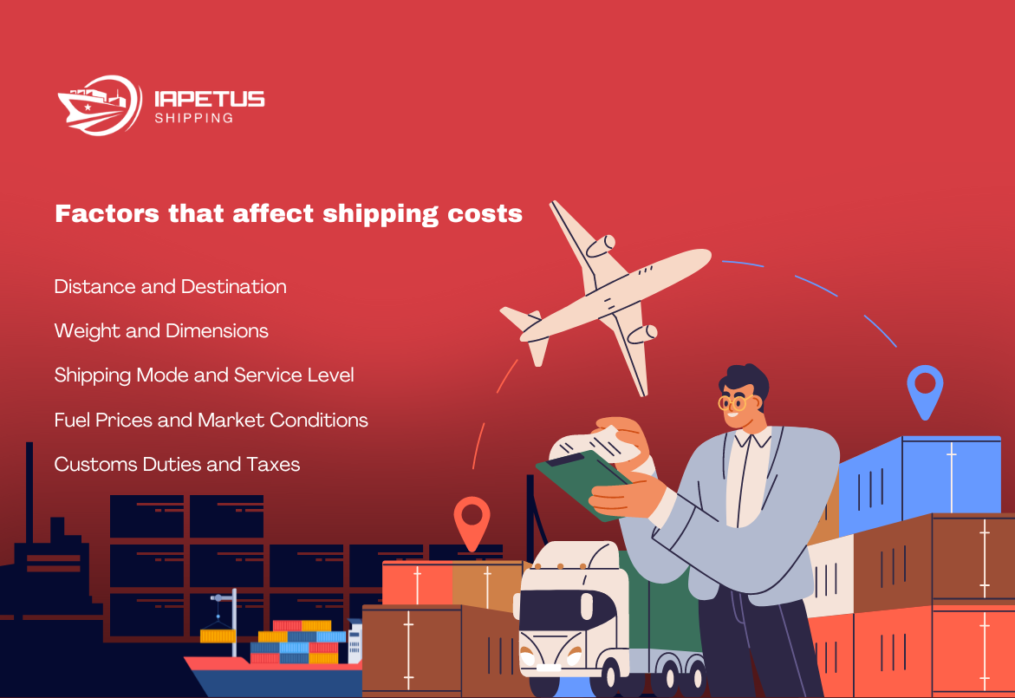Factors that Influence Shipping Costs & How to Reduce Them
In the world of logistics, managing shipping costs is a critical aspect that directly impacts a company’s bottom line. For businesses like Iapetus Shipping, understanding the factors influencing shipping costs and implementing strategies to mitigate them can lead to significant savings and enhanced competitiveness.
Let’s delve into some key factors that influence shipping costs and explore effective ways to reduce them.
1. Distance and Destination:
The distance goods need to travel and the destination plays a pivotal role in determining shipping costs. Longer distances typically incur higher transportation expenses. Moreover, shipping to remote or less accessible destinations may involve additional surcharges. To reduce costs, businesses can optimize shipping routes, consolidate shipments, and explore alternative transportation modes.
2. Weight and Dimensions:
Heavier and bulkier shipments generally incur higher transportation fees due to increased fuel consumption and handling complexity. Carriers often employ dimensional weight pricing, where the shipping cost is based on package dimensions rather than its actual weight. To minimize costs, businesses should focus on efficient packaging practices, utilizing packaging materials that are lightweight yet sturdy, and avoiding excessive packaging that adds unnecessary weight and volume.
3. Shipping Mode and Service Level:
The choice of shipping mode and service level significantly impacts shipping costs. Expedited or premium services come with higher price tags compared to standard or economy options. Businesses should carefully assess their shipping requirements and opt for the most cost-effective service level that meets their delivery deadlines without compromising customer satisfaction. Additionally, consolidating shipments and leveraging bulk discounts from carriers can result in substantial cost savings.
4. Fuel Prices and Market Conditions:
Fluctuations in fuel prices and market conditions can influence shipping costs. Rising fuel costs often lead to increased transportation expenses, which are eventually passed on to customers. To mitigate the impact of fuel price volatility, businesses can negotiate fuel surcharge agreements with carriers or explore alternative fuel-efficient transportation options. Staying informed about market trends and adjusting shipping strategies accordingly can help optimize costs in dynamic environments.
5. Customs Duties and Taxes:
International shipments are subject to customs duties, taxes, and import/export regulations, which can significantly inflate shipping costs. Businesses should accurately declare the value of goods, ensure compliance with customs requirements, and explore opportunities to minimize duties through preferential trade agreements or duty drawback programs. Partnering with experienced customs brokers or freight forwarders can streamline the customs clearance process and help mitigate unexpected expenses.
6. Packaging and Handling:
Poorly packaged or fragile items are more susceptible to damage during transit, leading to additional handling and insurance costs. Investing in quality packaging materials and implementing proper handling procedures can minimize the risk of damage and reduce associated expenses. Moreover, optimizing warehouse layouts and streamlining order fulfillment processes can enhance efficiency and lower labor costs associated with handling shipments.
7. Technology and Automation:
Leveraging technology and automation can drive efficiency gains and cost savings in shipping operations. Implementing transportation management systems (TMS), route optimization software, and warehouse management systems (WMS) can streamline processes, improve visibility, and reduce administrative overheads. Additionally, incorporating IoT-enabled tracking devices and predictive analytics can optimize inventory management and facilitate proactive decision-making to mitigate disruptions and avoid costly delays.
Conclusion:
In conclusion, navigating the complexities of shipping costs is crucial for businesses like Iapetus Shipping to remain competitive in the global marketplace. By comprehending the various factors influencing shipping expenses and adopting strategic measures to minimize them, companies can optimize their logistics operations and bolster profitability.
Whether it’s optimizing packaging, negotiating carrier contracts, or leveraging third-party logistics providers, proactive cost management is essential. For further guidance on optimizing shipping strategies and reducing costs, feel free to contact Iapetus Shipping. Together, we can navigate the seas of shipping costs and steer towards greater efficiency and profitability.
